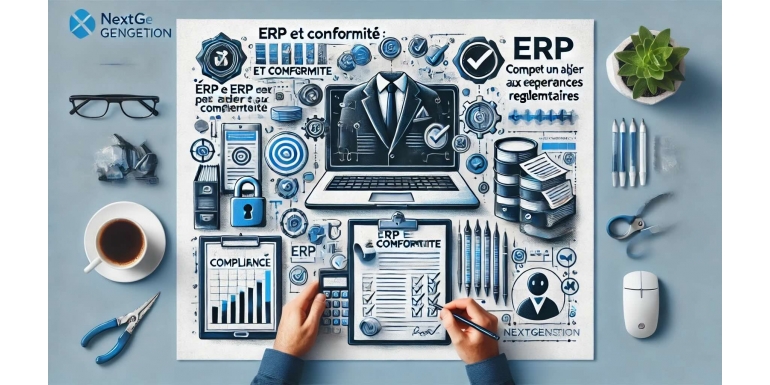
ERP and Compliance: How an ERP Can Help Meet Regulatory Requirements
In an increasingly regulated business environment, companies must navigate complex and ever-changing regulatory requirements. Compliance is essential not only to avoid penalties but also to protect the company's reputation. An ERP (Enterprise Resource Planning) system can play a crucial role in managing compliance by centralizing data, automating processes, and providing effective tracking and reporting tools. This article explores in detail how an ERP can help your company meet regulatory requirements.
1. Centralizing Data for Enhanced Compliance
One of the primary features of an ERP system is data centralization. By integrating all company information into a single system, an ERP allows for more efficient data management, ensuring accuracy and integrity.
-
Unified Data Access: An ERP centralizes all company data, including financial information, employee records, inventories, and business transactions. This provides better visibility of operations and facilitates compliance with data retention and traceability requirements.
-
Reduced Error Risks: By eliminating data silos and reducing manual data entry, an ERP minimizes the risk of errors that could lead to non-compliance.
2. Automating Compliance Processes
ERP systems are equipped with automation features that can help standardize and streamline compliance processes. Automation ensures that repetitive and critical tasks are performed consistently and on time.
-
Automated Compliance Reporting: An ERP can automatically generate compliance reports based on accurate and up-to-date data. These reports can be customized to meet the specific requirements of different jurisdictions and regulations.
-
Automatic Monitoring of Regulatory Changes: Advanced ERP systems can be configured to track regulatory changes and automatically adjust internal processes to remain compliant.
-
Alerts and Notifications: An ERP can issue alerts and notifications to remind users of critical deadlines, such as report submission dates or license renewals.
3. Risk Management and Internal Controls
Risk management is a crucial component of regulatory compliance. ERPs offer robust tools to identify, assess, and mitigate risks associated with business operations.
-
Access Controls and Data Security: An ERP allows for strict access controls, ensuring that only authorized personnel can access sensitive information. This helps meet data protection requirements and prevent security breaches.
-
Internal Audits: ERPs facilitate internal audits by providing quick access to relevant information and enabling the tracking of all user activities. This allows for the detection and correction of deviations from company policies.
-
Financial Risk Management: By centralizing financial information, an ERP allows for monitoring cash flows, financial commitments, and high-risk transactions, contributing to proactive risk management.
4. Tracking and Traceability of Operations
Traceability is a key aspect of compliance in many industries, including food, pharmaceuticals, and manufacturing. An ERP provides advanced tracking capabilities that allow you to trace every step of production and distribution processes.
-
Product Traceability: An ERP can track each product throughout the supply chain, from raw materials to the finished product. This enables quick and efficient responses to product recalls or regulatory investigations.
-
Batch and Serial Number Management: Batch and serial number management features ensure that products can be tracked accurately, even in mass production. This is particularly important for industries subject to strict quality regulations.
-
Transaction History: An ERP records all transactions in detail, making it easier to verify compliance during external and internal audits.
5. Supporting Multijurisdictional Compliance
For companies operating internationally, managing compliance across multiple jurisdictions can be a major challenge. An ERP provides tools to navigate different regulations and ensure that the company remains compliant wherever it operates.
-
Managing Different Regulations: An ERP can be configured to handle the regulatory requirements of multiple countries, ensuring that operations comply with local laws, international standards, and trade agreements.
-
Adapting to Tax Requirements: ERPs can automate tax management, applying the appropriate rates and generating reports that comply with local tax requirements.
-
Sector-Specific Compliance: ERPs also ensure that the company meets sector-specific standards, such as ISO, GMP (Good Manufacturing Practices), or HACCP (Hazard Analysis and Critical Control Points).
6. Reporting and Analytics for Continuous Compliance
A crucial aspect of compliance is the ability to continuously monitor operations and analyze compliance performance. ERPs provide powerful reporting and analytics tools to support this effort.
-
Compliance Dashboards: ERPs allow for the creation of customized dashboards that provide an overview of the company's compliance status in real-time. These dashboards can include compliance-specific key performance indicators (KPIs).
-
Automated Reports: In addition to regulatory reports, an ERP can generate internal reports that track compliance progress and identify areas that need improvement.
-
Predictive Analytics: Some advanced ERP systems offer predictive analytics capabilities, allowing you to anticipate compliance risks and take proactive measures to avoid them.
Conclusion: ERP, an Essential Tool for Compliance
In an increasingly complex regulatory environment, an ERP is an indispensable tool for any company seeking to ensure compliance. By centralizing data, automating processes, providing risk management tools, and facilitating reporting, an ERP not only helps meet current regulatory requirements but also prepares for future challenges. By adopting an ERP, companies can not only avoid penalties but also strengthen their reputation and position in the market.
